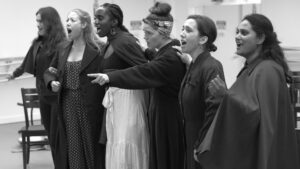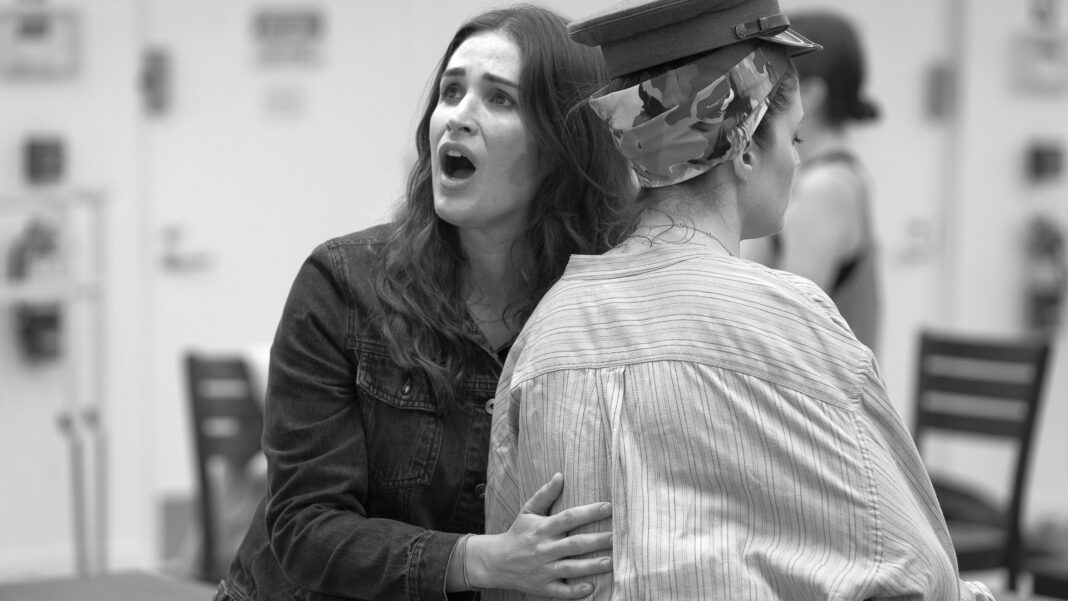
“I’m honored that the late Ruth Bader Ginsburg donated to this project. And I think of her every time I need a little inspiration to keep going.” Composer Kirsten Volness isn’t exactly sure how the late Supreme Court Justice became aware of her opera, Letters That You Will Not Get: Women’s Voices from the Great War, but she’s certainly grateful to have had her support.
The opera has its world premiere from The American Opera Project on Friday, July 29th at the Space at Irondale in Brooklyn.
Performances will continue there through August 7th.
Letters That You Will Not Get is inspired by letters written by women from around the world who participated in World War I. Whether as volunteers on foreign soil or keeping the family home operational, these are all letters that never got mailed.
Volness was recruited by librettists Susan Werbe and Kate Holland who selected the letters to be included in this opera. The work, however, began as a song cycle for two sopranos, two mezzo sopranos, a violin and a cello and ran 25 minutes. Letters was ultimately expanded to include an additional soprano and mezzo soprano and is now scored for a string quintet and runs 75 minutes.
Last week I spoke with Volness about the process of composing Letters, the many styles of music she utilizes in the score and how she might define what an opera is and how Letters fits into that. What follows are excerpts from our conversation that have been edited for length and clarity.
If you’re writing something based on letters versus writing to lyrics or a poem, the people who write the latter are influenced by rhythm and sonority and all kinds of other things that naturally lend themselves to music. Letter writers do not have to consider that. So where did you find the rhythm?
So it really varies in terms of the orchestration and the focus, but in the end I think that many of the songs are actually poems and Kate Holland, one of the librettists, was able to tweak things a little bit to make them more singable; to clarify them sometimes if it was too long of a text, just to make it fit better within the piece. So there is some editing going on.
I would say a lot of the music was inspired by the words themselves. For instance, one song called Socks the first line is “shining pins that dart and click.” And that rhythm is what starts the piece. It’s this little seven/eight groove. So I find myself drawn to the rhythm and the contours of the words to start with when I’m trying to figure out what I’m doing with it.
Does this music look back from a contemporary perspective at these letters or did you try to emulate the music of the period?
I was really bringing in lots of contemporary musical influences past here in 1918 in setting these songs. I was really trying to approach them more as folk songs or pop songs because I wanted the idea to be that this could be any person out there singing these things. One of the weird qualities of this opera is that there aren’t specific characters, they’re more archetypal characters. So there’s one song where they’re all nurses. In other moments they’ll be the mother or the wife or the factory worker.
The letters come from all over the world: Europe, Asia, Africa, the Caribbean in addition to the United States. What role, if any, did the origin of the women who were writing the letters have in writing the music?
Good question. I’d say that I specifically tried not to use the musical reference. For instance, one song was written by an anonymous Irish person and I didn’t try to write Irish inspired music for that one. I was trying to avoid anything that would seem appropriate to it in that way. But at the same time, there are some songs where I really need a sense of rhythm and this idea of drums or even the march of battle involves that sort of sound world. So that comes back a lot in different songs and I think a lot of it was just based on what seemed like it would fit also within the narrative of the piece.
What was your approach then the composition of the music and did you factor in who was going to be singing these parts you were writing?

I think in the end I was trying to convince the opera singers to sing less like opera singers in a lot of ways. They definitely have moments where they’re belting out and showing off the beautiful capabilities of their bel canto singing style. But there are also moments where it’s more of a groovy piece that I want them to sing around the beat. Or there are definitely moments where I ask them to sing more like a jazz singer and they can sort of embellish things. There are improvisational moments where they can all sing together and that’s one of the dance scenes. Definitely I was thinking about the people singing it.
Given the way you just described it, why isn’t this just a song cycle instead of a chamber opera? At what point, given what you just described, does it cross over to be a chamber opera by your own description?
You know, that’s a good question because I honestly never thought I would write an opera because it just feels like this huge, sprawling thing. I always thought I would be more drawn to film or something. It just feels like an artifice. So I think what really makes this an opera is the way that the singers interact with one another and the staging really take it beyond a song cycle. And I think they’re doing lots of interesting transitions to get from one piece to the next.
I asked the same question to myself. What is an opera anyway at this point? I think we’re breaking that word down a bit to be different things. I think anything goes in opera. That’s the beautiful part about it.
Did you come to appreciate the value of letter writing?
Yes, definitely. I’ve taken to writing more letters to people and doing the old-fashioned snail mail sort of thing, especially during pandemic. I just got to the point where I didn’t want to look at my computer anymore at all. I think if you really slow down there’s less editing involved. You have to scribble things out if you mess up. There’s something more deliberate about it maybe that isn’t quite as glib. There’s more time to pour your thoughts and do some reflection.
Helen Fairchild, a Pennsylvania nurse who volunteered for World War I in April of 1917 was a prolific letter writer. She died less than a year later. Her niece, Nell Fairchild, commented on her aunt’s service in an interview with Military.com. She said, “When school boys told me my aunt didn’t count as a soldier because she was a girl, i was stunned. How could anyone say she was not a veteran, too?” What would you like the world to know about these women and how do you think Letters will serve as a catalyst for giving them the recognition that they deserve?
I think centering their voices in their own words is an important first step. This is a great moment to show all the different ways that they did stand up and put in their effort toward finding peace and bringing the soldiers home safely.
There’s one song about how Alice Dunbar Nelson was unable to participate in the way she would have liked to nurse Black soldiers because they were not allowed to be tended to by White nurses. So there’s a lot of different ways that you see women standing up and doing what needs to be done to help everyone get through this. There are moments that talk about knitting socks or sewing and it shows different aspects of just being stuck at home with the children. How hard it is to just sit and wait and not know what’s going on and to feel powerless.
So I think that there are lots of different aspects of these women’s lives that are empowering. Regardless of what the activities are that they’re doing, it’s really clear that their job is as important to keep the whole thing together.
To see our full interview with Kirsten Volness, please go here.
Main photo: Letters That You Will Not Get in rehearsal (Photo by Steven Pisano/Courtesy The American Opera Project)










